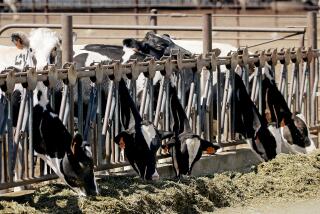Cold Snap Expected to Put Chill on State’s Economy : Agriculture: Economists worry about ripple effect of farming-area shutdowns and rising produce prices.
- Share via
The record cold spell that has pierced California already is having a dramatic impact in small California farming towns, where the local economy depends on picking, packing or trucking fruits and vegetables during the winter months.
Because so much of California’s economy relies on agriculture, economists said that the financial woes caused by the state’s record-breaking cold spell may spread beyond the San Joaquin Valley, Monterey Peninsula, North San Diego County, Ventura County and other rural areas.
Higher prices for a wide variety of fruits and vegetables could also boost the consumer price index in California and nationwide. Consumers, forced to spend more on food, also may further cut back discretionary spending, worsening the recession.
“This is just one more negative factor on top of many others,” said Ken Ackbarali, chief economist with First Interstate Bancorp. in Los Angeles. “It does have a tendency--and it will have a tendency--to deepen the recession.”
Although California is host to large industries such as aerospace, banking and tourism, agriculture has the widest influence on the economy, said Jack Kyser, chief economist with the Los Angeles Area Chamber of Commerce.
The state boasts farm revenues of $17.5 billion and employment of 370,000. Agriculture also fuels employment in a wide array of related industries, including manufacturing, trucking and exporting.
Consequently, when the agricultural industry is hurt, financial woes ripple throughout the state, he said.
“It is a major employer, a major producer of goods in the state,” Kyser added. The freeze “is probably going to make California’s financial picture a bit stickier in 1991.”
The cold spell that brought nearly two weeks of freezing temperatures to many parts of the state seems to have ended, with forecasts calling for a warming trend. However, the state’s farmers continue to worry. The state is now facing its fifth year of drought, and for their crops to recover from the freeze they will need adequate water.
Already, the state’s consumers are feeling the pinch in higher prices for oranges, lemons, avocados, broccoli, celery, lettuce, artichokes and other fruits and vegetables affected by the freeze. In some cases, prices for fresh produce are twice what they were two weeks ago.
In communities such as Lindsay, a small farming town near Visalia, the impact is more direct.
In the past few weeks, about 2,000 of the San Joaquin Valley city’s 9,000 residents have lost their jobs, said Mayor John Maynard. Between 45% and 50% of the residents are affected by the success of the local citrus crop, he said.
Maynard, who also owns the town’s Ace Hardware and Western Auto franchises, recently canceled equipment orders, attempting to prepare for what are likely to be exceptionally lean times ahead.
“During the next several months, things are going to be very slow economically,” Maynard said. “People’s income and their buying power are going to be seriously curtailed. They’ll buy what they absolutely need, and that’s it. Their primary concerns are keeping their families fed and in housing.”
Just down the road in Orange Cove, retailers are also worried.
“In the next couple of months, we are really going to feel it,” said Don Hamburger, owner of Orange Cove Pharmacy.
Orange Cove, a community of fewer than 4,000, is supported by six local citrus picking and packing operations. The plants that are not already closed are working with skeleton crews. Many believe that everything will be shut by the end of the week because the freeze destroyed virtually all citrus on trees. There is nothing left to pick or pack, one grower said.
Entire families have been thrown out of work, and other businesses are finding that demand for a wide variety of goods and services has dried up. If farm town residents did not believe the government would come to their aid with unemployment assistance and disaster relief funds, “this thing would be a disaster,” Maynard said.
“It affects the whole economy of the county and of the state when something like this happens,” said Don Aluisi, a grower and packer at Aluisi Farms in Clovis. “You lose the workers, the packers, the truckers and it trickles down to the people who supply the wax and the cartons, and it goes on and on.”
People have no money to spend, said Keith Nilmeier, a Fresno grower.
“My family and I are making some major lifestyle changes. We don’t go out to eat anymore. We aren’t going to the movies. Anything that is not a necessity is not purchased, period,” he said. “And I am fortunate. I’ll get through this. I feel sorry for the people who just farm oranges. If they have loans to pay on their farms, they are in a big world of hurt.”
More to Read
Inside the business of entertainment
The Wide Shot brings you news, analysis and insights on everything from streaming wars to production — and what it all means for the future.
You may occasionally receive promotional content from the Los Angeles Times.










